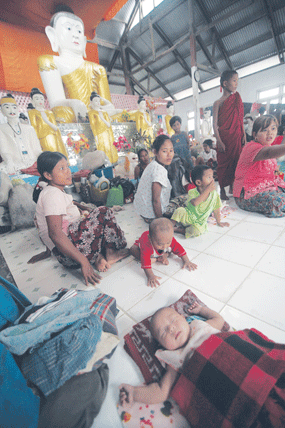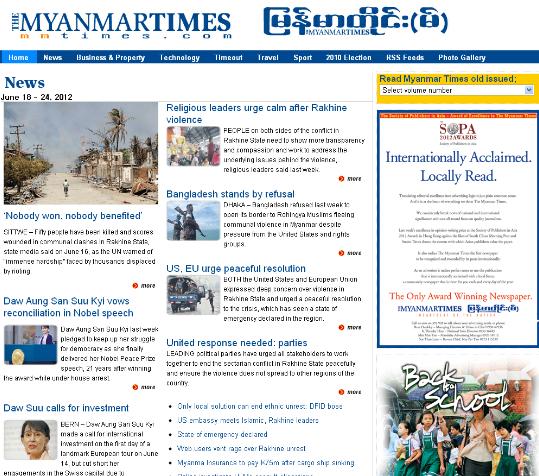Major news in Burma on Jun 20 : Religious leaders urge calm after Rakhine violence
Top news in <The Myanmar Times> : Religious leaders urge calm after Rakhine violence
PEOPLE on both sides of the conflict in Rakhine State need to show more transparency and compassion and work to address the underlying issues behind the violence, religious leaders said last week.
The violence between the Rakhine and Rohingya groups has divided Myanmar society and prompted fears that it could spread to other areas.
A preacher from the 59th Street mosque told The Myanmar Times on June 15 that all people needed to work together to prevent the spread of racial or religious violence in all its forms.

People displaced by communal violence in Rakhine State take refuge in Sittwe’s Maha Zaya Thateddi Adate Htan Monastery on June 14. Pic: Boothee
“I believe it is not only the responsibility of religious leaders but all people to participate in building peace. We talk about peace between the different faiths a lot but people need to practise it with their actions as well,” U Sann Aung said.
“The problem is strong personal feelings. People can’t control their anger and they forget to try and find out the reality behind the situation. For example, when they see a house has been burnt their first thought is to respond with violence,” he said.
“And although some religious leaders talk about peace and the need for calm, they also can’t control their personal aggression and anger. The enemy is their own anger, which gives them destructive thoughts.”
U Sann Aung said the media had an important role to play and could be both a positive and negative force depending on how journalists and editors approached the issue.
“The news media, including state media, should find out the real voices of those who want peace and try to heal the situation by presenting balanced stories so that readers can decide on the situation accurately,” he said, adding that he believed unbalanced reporting in state media at the start of the conflict had exacerbated the situation.
“The media is a powerful tool and can create tension if people are not careful. I wish all journalists would find a sense of balance and be careful not to make the situation worse,” he said.
On June 15, the head of the State Sangha weighed into the debate, calling on people not to take revenge and to solve the conflict in Rakhine State with loving kindness.
The venerable Kumara Biwontha (Bhamo Sayadaw) said all people should enjoy the right to practice their religion freely, should show sympathy to each other and avoid violence.
“If we could review the problem with wisdom, all can seek peace and tranquility,” the venerable said in a message published in state media.
The message was published the day that rumours suggested Muslims would be targeted while going to pray at mosques. While the violence did not materialise, Ko Nyi Nyi, a Muslim resident of Yangon, said the rumours had made the situation go “from bad to worse”.
“The issue is arising because of the actions of the former government but now the country is on the road to democracy all people should seek to solve problems with justice and calm,” he said.
Meanwhile, the Shwedagon Pagoda board of the trustees announced in a statement that they would prevent any group from using the pagoda as an assembly point for demonstrations or campaigns.
Secretary U Win Kyaing said the board did not want pilgrims and tourists to be disturbed during their visit.
“This place is one of our country’s main attractions and a holy site so we have to occasionally introduce rules for the sake of people so they can find space for inner peace and paying respect to the Buddha,” he said.
A member of the board of trustees of Sule Pagoda – a focal point for recent protests – said demonstrations were also not allowed at the downtown Yangon pagoda.


























































